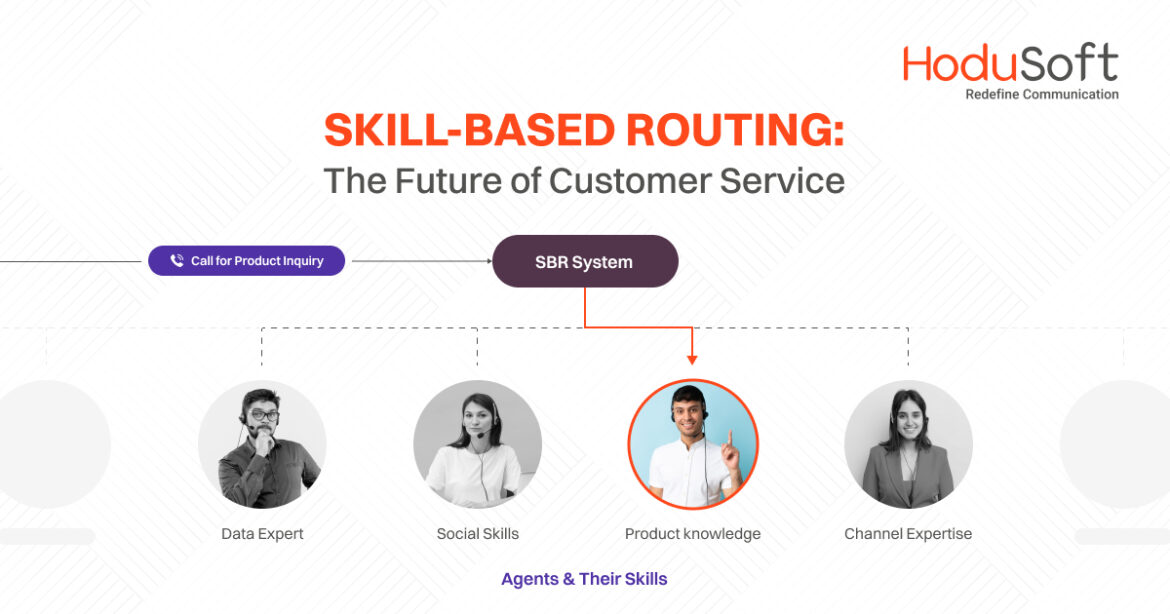Call centers are fast-paced environments where every second counts, and every call matters. In most call centers, 80% of calls are answered within 20 seconds, even though efforts are being made to improve those numbers to 90% within 15 seconds. A sign of good customer service experience is perceived by 73% of consumers when brands prioritize the value of their customers’ time. If customer’s concerns are not resolved quickly and efficiently, it may lead to frustration among customers.
One way to deal with customers’ queries quickly and efficiently is by landing their calls in the right hand. So, how do call centers ensure that the incoming calls reach the right agent or department? Well, here skills-based routing comes into play. Using this technology, call centers can easily streamline their operations and improve customer service experience. In this blog, we will discuss all about skill-based routing and how it impacts customer satisfaction and business growth.
What Is Skill-Based Routing?
Skill-based routing, also known as skill-based distribution, is a call routing strategy that enables call centers to connect customer’s calls to the agents with the most relevant skills for handling customer concerns.
By reducing the chances of customers being transferred from one agent to another, skill-based routing helps them reach the right agent who can resolve their concerns on the first call. This further leads to an increased FCR (First Call Resolution) rate.
How Does Skills-Based Routing Work?
Skill-based routing is a sophisticated mechanism used in call centers and omnichannel contact centers to enhance customer service experience. The process usually works in the following manner-
- Initial interaction: It starts with the customer’s initial interaction. In this stage, all the important details are gathered like the type of inquiry and other relevant information.
- Data analysis: After collecting all the relevant data, it is then analyzed to match it with predefined criteria and skill sets assigned to each available agent.
- Identifying the most suitable agent: The system uses algorithms to determine the most appropriate agent for the specific customer query, considering factors like technical knowledge, product know-how, language proficiency, and others.
- Call routing: Once the system matches the customer query with the best-suitable agent, it routes the calls to that agent. This ensures prompt and effective resolution of customer concerns by professionals who are equipped with the required skills to address their needs.
These steps in skill-based routing help in better optimization of customer support operations, leading to increased agent productivity and overall operational efficiency.
How Skill-Based Routing Differs from Traditional Call Routing Methods?
In most traditional call centers and contact centers, call routing is based on a first-come, first-serve model. Traditional methods of call routing generally direct calls to the next available agent, regardless of their skills or expertise. This routing approach leads to longer wait times and reduced first-call resolution rates as customers may be connected to agents who are not capable of handling their concerns quickly and efficiently.
Skill-based routing, on the other hand, ensures that each incoming call reaches the most appropriate agent at the right time. Industries that deal with customer-centric operations and have call centers or contact centers, can greatly benefit from using skills-based routing software. Some of the industries that must implement skill-based routing systems to enhance customer experiences include telecommunications, financial services organizations (like banks, insurance companies, etc.), retail, healthcare, hospitality, e-commerce, and more.
What Skills and Criteria Are Considered When Implementing Skill-Based Routing?
Companies operating call centers and omnichannel contact centers can enjoy significant benefits from using skill-based routing technology. They can implement skill-based routing based on various skills and criteria-
- Product knowledge: Customers having complex product-related queries can be routed to agents who have comprehensive knowledge about specific products or services. They can provide all the detailed information or troubleshooting guidance to assist customers in the best possible manner.
- Language proficiency: To serve multilingual customer bases, language proficiency is crucial. It ensures that customers are connected with agents who are proficient in the language they prefer. This helps in providing a personalized experience to the customers.
- Technical expertise: For customers who are dealing with technical issues, calls can be routed to agents who have expertise in troubleshooting technical issues. Agents having software, hardware, or other specific technical knowledge can offer better technical support to the customers.
- Other customer service: In some cases, customer inquiries do not require technical expertise, but rather excellent customer service skills such as empathy, active listening, and problem-solving. Agents with such skills can handle customer concerns with ease.
- Department-specific expertise: Big enterprises with various departments may require routing customer calls to the agents in specific departments. For instance, customers can connect to the sales department, billing department, or any other department via skill-based routing.
- Specific certification or training: Some types of customer inquiries may require agents with specific certifications or training related to the products or services they support.
Increasing customer satisfaction and improving overall efficiency can be achieved by matching customer requirements with the skills of the agent.
Benefits of Skill-Based Routing for Businesses
For customer-centric businesses, skill-based routing offers numerous benefits. Some of the key benefits include-
- Improved agent productivity- With skills-based routing, customer service representatives can focus on queries they know how to handle effectively. They get the type of queries that are within their areas of expertise. This leads to improved agent productivity and job satisfaction, ultimately contributing to enhanced employee retention rates.
- Improved first-call resolution: Connecting customers with agents who have the required skills and knowledge to address their concerns increases the chances of resolving queries during the initial interaction itself. This reduces the need for callbacks and minimizes the overall call volume.
- Enhanced customer experience: Connecting customers with the most appropriate agent helps in offering satisfactory answers to the customers. Well-trained agents who understand the exact needs of customers can address customer inquiries promptly and effectively, leading to improved customer experience and loyalty.
- Reduced call handling time: Calls can be routed effectively to agents with the appropriate skills, resulting in shorter call durations and reduced wait times for customers. As a result, resources are optimized and overall operational efficiency is improved.
- Efficient resource utilization: Skills-based routing allows companies to optimize workforce management, reduce operational costs, and maximize the utilization of human resources by allocating resources more effectively.
- Customized customer service: A skill-based routing system enables businesses to provide personalized customer service by directing calls to agents who can provide specialized assistance, resulting in tailored solutions and positive brand perceptions.
Overall, whether it’s about improving customer experience, operational efficiency, or customer relationships, skill-based routing has the potential to make a huge impact on your business.
The Future of Skill-Based Routing in Customer Service
The use of skill-based routing has greatly transformed the call management process for businesses. However, it’s just the beginning. We will get to see more advancements in technology that will further revolutionize and streamline the operations of customer-centric businesses. For instance, the advancement in AI (Artificial Intelligence) and ML (Machine Learning) technologies will help companies set them at the forefront of customer service.
These advancements will not only help in improving customer service but also prepare organizations to meet the future demands of the marketplace. With accurate implementation and continuous improvement, skill-based routing will emerge as a powerful tool, helping businesses leverage significant advantages and secure a strong place in tomorrow’s competitive marketplace.
Conclusion:
Businesses that are looking to deliver exceptional customer service and boost overall operational efficiency, must implement a good skill-based routing software. Together with advanced technologies, a skill-based routing system can help provide omnichannel experiences, improve personalization, deliver superior customer service, and enhance overall operational efficiency.



